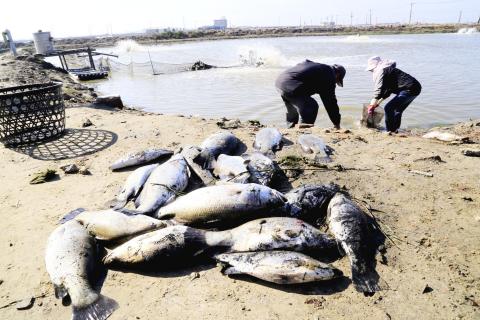The nation’s agriculture and aquaculture sectors suffered losses worth hundreds of millions of New Taiwan dollars due to one of the strongest cold fronts in years, with legislators calling on the government to accelerate efforts to assess damage and provide compensation.
The cold spell has caused irreparable damage to 1,583 hectares of crops, with strawberries suffering the most damage, the Council of Agriculture said.
Mass die-offs of fish were reported in central and southern municipalities, with Tainan bearing the brunt, as the city alone suffered losses of NT$231.86 million (US$6.88 million) in damaged fish stock, especially milkfish.

Photo: CNA
Losses as of yesterday totaled NT$404.81 million, with the aquaculture sector registering the heaviest losses, at NT$327.08 million.
The council on Monday declared all cities and counties in the nation as disaster areas, and farmers who sustained losses of more than 20 percent of their crops or stock can apply for a cash grant to resume farming, while damage in the fishery industry was expected to continue to increase.
Legislator Lee Hung-chun (李鴻鈞) — who quit the Chinese Nationalist Party (KMT) and joined the People First Party (PFP) before the elections — said prices of vegetables in the past few days were appreciably higher than in the same period last year, while demand would continue to increase ahead of the Lunar New Year holidays, so the government should set up measures to stabilize the market and maintain reasonable prices.
Non-Partisan Solidarity Union Legislator May Chin (高金素梅) said the damage wrought by cold and snow in mountainous areas had not been seen in decades, and the government should enact special compensation measures for damaged crops grown at higher altitudes, which provide a livelihood to many Aborigines.
PFP legislator-elect Chou Chen Hsiu-hsia (周陳秀霞) said 90 percent of the fishing ponds in Tainan’s Syuejia District (學甲), or about 1,800 hectares of ponds, were damaged, and salvaged fish could only be left to rot because of insufficient freezer storage facilities.
Chou Chen called on the government to place more freezers in fish farming regions to reduce losses.
Agriculture and Food Agency Deputy Director Chen Chun-yen (陳俊言) said the diminishing supply of vegetables was largely due to delays in harvests rather than weather damage, and that vegetables were damaged as much as fruit trees, which suffered the most damage.
The damage to milkfish stocks would not have a significant impact on the supply of aquatic products, as the shortage could be made up by other fish species and ocean fisheries, Chen said.

Taiwan is stepping up plans to create self-sufficient supply chains for combat drones and increase foreign orders from the US to counter China’s numerical superiority, a defense official said on Saturday. Commenting on condition of anonymity, the official said the nation’s armed forces are in agreement with US Admiral Samuel Paparo’s assessment that Taiwan’s military must be prepared to turn the nation’s waters into a “hellscape” for the Chinese People’s Liberation Army (PLA). Paparo, the commander of the US Indo-Pacific Command, reiterated the concept during a Congressional hearing in Washington on Wednesday. He first coined the term in a security conference last

Prosecutors today declined to say who was questioned regarding alleged forgery on petitions to recall Democratic Progressive Party (DPP) legislators, after Chinese-language media earlier reported that members of the Chinese Nationalist Party (KMT) Youth League were brought in for questioning. The Ministry of Justice Investigation Bureau confirmed that two people had been questioned, but did not disclose any further information about the ongoing investigation. KMT Youth League members Lee Hsiao-liang (李孝亮) and Liu Szu-yin (劉思吟) — who are leading the effort to recall DPP caucus chief executive Rosalia Wu (吳思瑤) and Legislator Wu Pei-yi (吳沛憶) — both posted on Facebook saying: “I

Sung Chien-liang (宋建樑), who led efforts to recall Democratic Progressive Party (DPP) Legislator Lee Kun-cheng (李坤城), was released on bail of NT$80,000 today amid outcry over his decision to wear a Nazi armband to questioning the night before. Sung arrived at the New Taipei District Prosecutors’ Office for questioning in a recall petition forgery case last night wearing a red armband bearing a swastika, carrying a copy of Adolf Hitler’s Mein Kampf and giving a Nazi salute. Sung left the building at 1:15am without the armband and covering the book with his coat. Lee said today that this is a serious

A mountain blaze that broke out yesterday morning in Yangmingshan National Park was put out after five hours, following multi agency efforts involving dozens of fire trucks and helicopter water drops. The fire might have been sparked by an air quality sensor operated by the National Center for High-Performance Computing, one of the national-level laboratories under the National Applied Research Laboratories, Yangmingshan National Park Headquarters said. The Taipei City Fire Department said the fire, which broke out at about 11am yesterday near the mountainous Xiaoyoukeng (小油坑) Recreation Area was extinguished at 4:32pm. It had initially dispatched 72 personnel in four command vehicles, 16